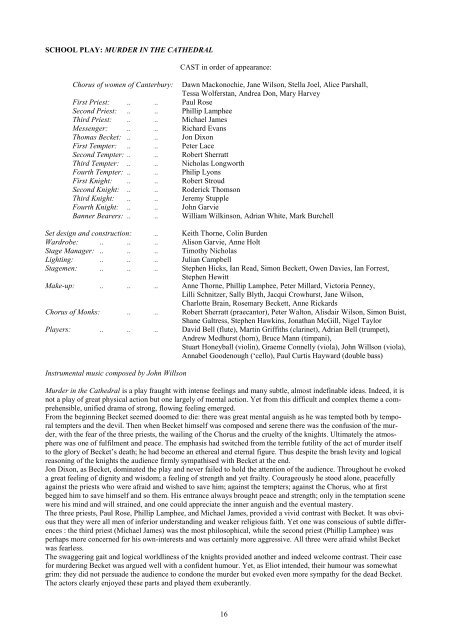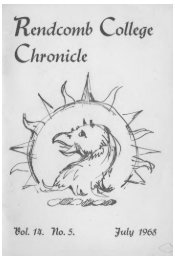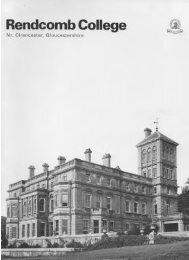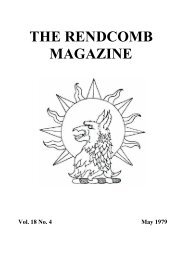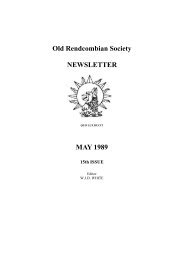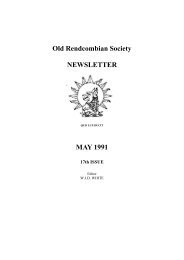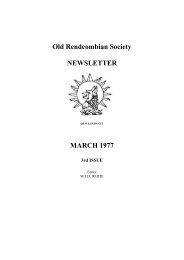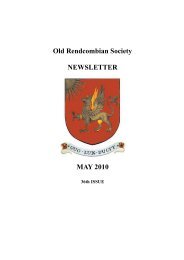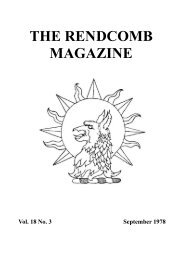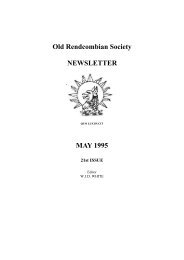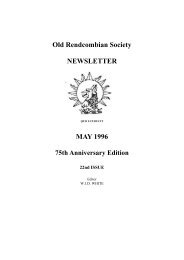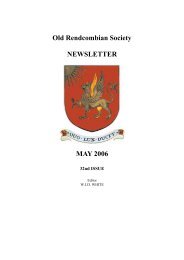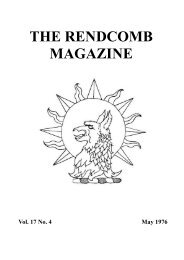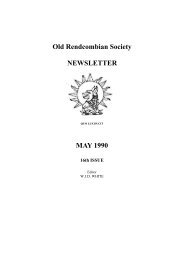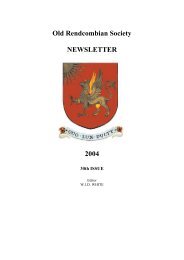The Rendcomb Magazine, May 1975 - The Old Rendcombian
The Rendcomb Magazine, May 1975 - The Old Rendcombian
The Rendcomb Magazine, May 1975 - The Old Rendcombian
- No tags were found...
You also want an ePaper? Increase the reach of your titles
YUMPU automatically turns print PDFs into web optimized ePapers that Google loves.
SCHOOL PLAY: MURDER IN THE CATHEDRALCAST in order of appearance:Chorus of women of Canterbury: Dawn Mackonochie, Jane Wilson, Stella Joel, Alice Parshall,Tessa Wolferstan, Andrea Don, Mary HarveyFirst Priest: .. .. Paul RoseSecond Priest: .. .. Phillip LampheeThird Priest: .. .. Michael JamesMessenger: .. .. Richard EvansThomas Becket: .. .. Jon DixonFirst Tempter: .. .. Peter LaceSecond Tempter: .. .. Robert SherrattThird Tempter: .. .. Nicholas LongworthFourth Tempter: .. .. Philip LyonsFirst Knight: .. .. Robert StroudSecond Knight: .. .. Roderick ThomsonThird Knight: .. .. Jeremy StuppleFourth Knight: .. .. John GarvieBanner Bearers: .. .. William Wilkinson, Adrian White, Mark BurchellSet design and construction: .. Keith Thorne, Colin BurdenWardrobe: .. .. .. Alison Garvie, Anne HoltStage Manager: .. .. .. Timothy NicholasLighting: .. .. .. Julian CampbellStagemen: .. .. .. Stephen Hicks, Ian Read, Simon Beckett, Owen Davies, Ian Forrest,Stephen HewittMake-up: .. .. .. Anne Thorne, Phillip Lamphee, Peter Millard, Victoria Penney,Lilli Schnitzer, Sally Blyth, Jacqui Crowhurst, Jane Wilson,Charlotte Brain, Rosemary Beckett, Anne RickardsChorus of Monks: .. .. Robert Sherratt (praecantor), Peter Walton, Alisdair Wilson, Simon Buist,Shane Galtress, Stephen Hawkins, Jonathan McGill, Nigel TaylorPlayers: .. .. .. David Bell (flute), Martin Griffiths (clarinet), Adrian Bell (trumpet),Andrew Medhurst (horn), Bruce Mann (timpani),Stuart Honeyball (violin), Graeme Connelly (viola), John Willson (viola),Annabel Goodenough („cello), Paul Curtis Hayward (double bass)Instrumental music composed by John WillsonMurder in the Cathedral is a play fraught with intense feelings and many subtle, almost indefinable ideas. Indeed, it isnot a play of great physical action but one largely of mental action. Yet from this difficult and complex theme a comprehensible,unified drama of strong, flowing feeling emerged.From the beginning Becket seemed doomed to die: there was great mental anguish as he was tempted both by temporaltempters and the devil. <strong>The</strong>n when Becket himself was composed and serene there was the confusion of the murder,with the fear of the three priests, the wailing of the Chorus and the cruelty of the knights. Ultimately the atmospherewas one of fulfilment and peace. <strong>The</strong> emphasis had switched from the terrible futility of the act of murder itselfto the glory of Becket‟s death; he had become an ethereal and eternal figure. Thus despite the brash levity and logicalreasoning of the knights the audience firmly sympathised with Becket at the end.Jon Dixon, as Becket, dominated the play and never failed to hold the attention of the audience. Throughout he evokeda great feeling of dignity and wisdom; a feeling of strength and yet frailty. Courageously he stood alone, peacefullyagainst the priests who were afraid and wished to save him; against the tempters; against the Chorus, who at firstbegged him to save himself and so them. His entrance always brought peace and strength; only in the temptation scenewere his mind and will strained, and one could appreciate the inner anguish and the eventual mastery.<strong>The</strong> three priests, Paul Rose, Phillip Lamphee, and Michael James, provided a vivid contrast with Becket. It was obviousthat they were all men of inferior understanding and weaker religious faith. Yet one was conscious of subtle differences: the third priest (Michael James) was the most philosophical, while the second priest (Phillip Lamphee) wasperhaps more concerned for his own-interests and was certainly more aggressive. All three were afraid whilst Becketwas fearless.<strong>The</strong> swaggering gait and logical worldliness of the knights provided another and indeed welcome contrast. <strong>The</strong>ir casefor murdering Becket was argued well with a confident humour. Yet, as Eliot intended, their humour was somewhatgrim: they did not persuade the audience to condone the murder but evoked even more sympathy for the dead Becket.<strong>The</strong> actors clearly enjoyed these parts and played them exuberantly.16


